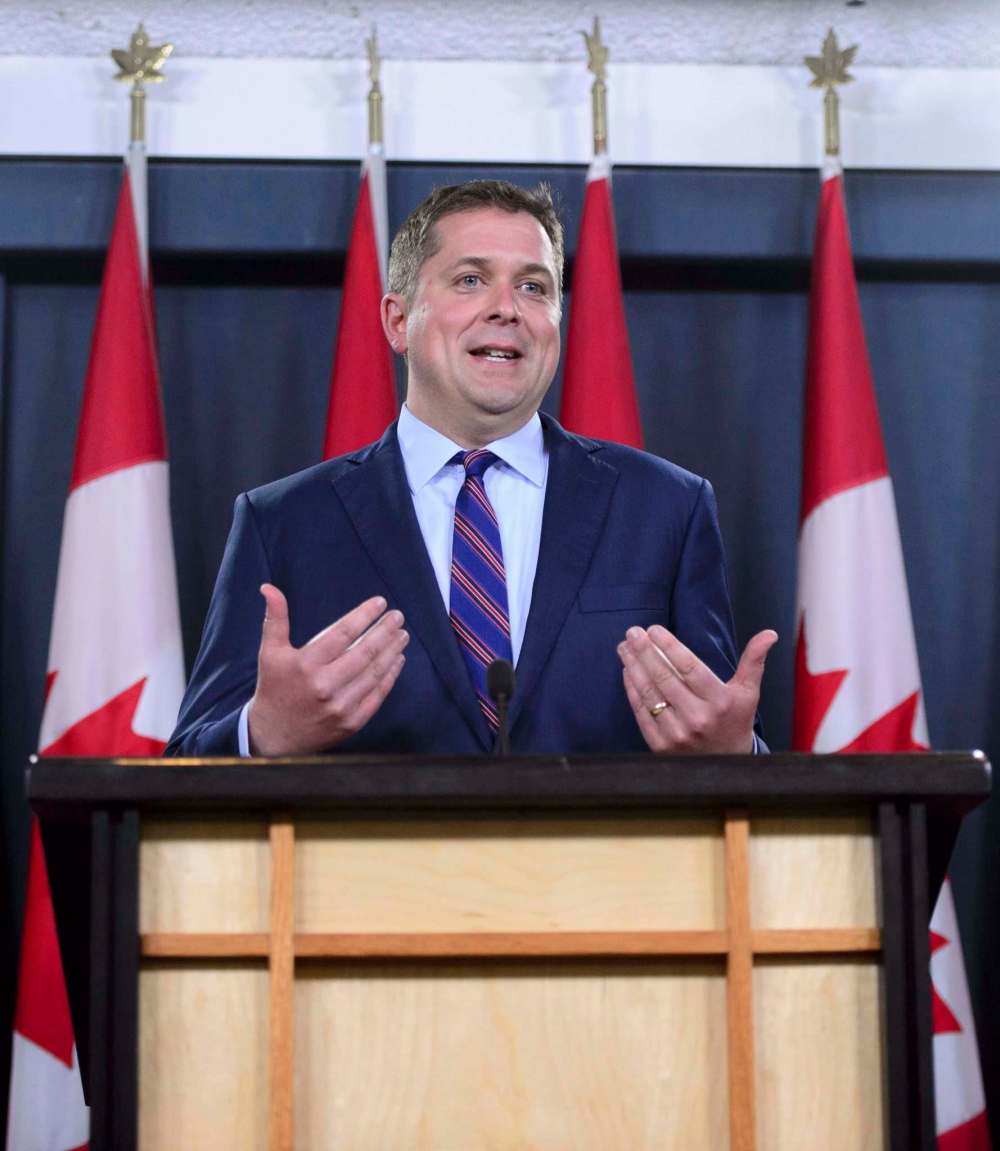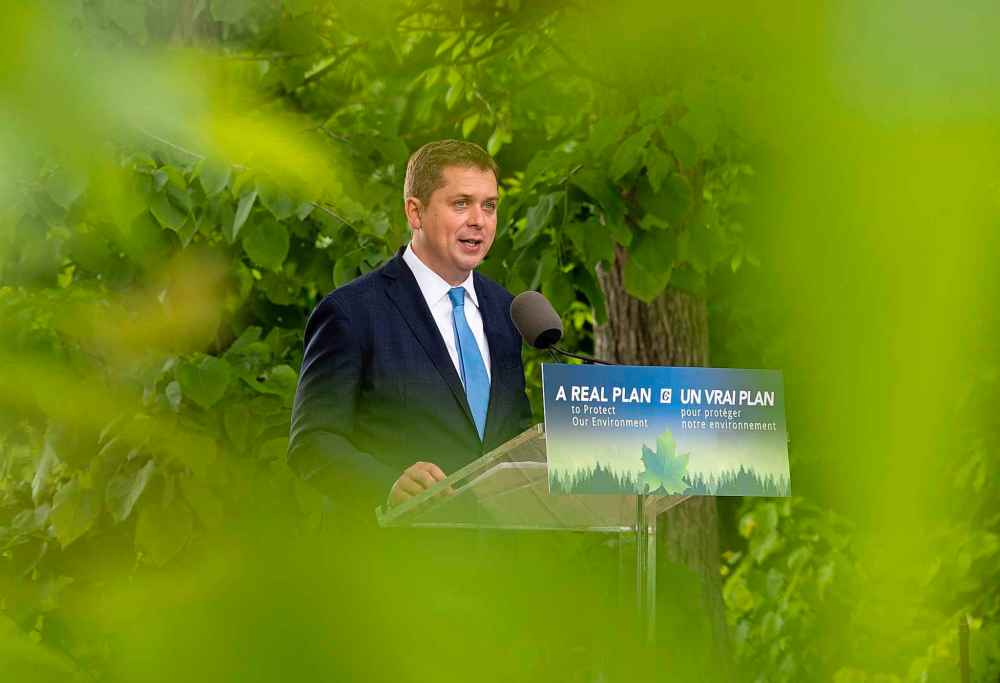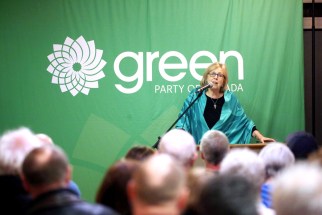Scheer campaign needs to fill in the blanks
Read this article for free:
or
Already have an account? Log in here »
To continue reading, please subscribe:
Monthly Digital Subscription
$0 for the first 4 weeks*
- Enjoy unlimited reading on winnipegfreepress.com
- Read the E-Edition, our digital replica newspaper
- Access News Break, our award-winning app
- Play interactive puzzles
*No charge for 4 weeks then price increases to the regular rate of $19.00 plus GST every four weeks. Offer available to new and qualified returning subscribers only. Cancel any time.
Monthly Digital Subscription
$4.75/week*
- Enjoy unlimited reading on winnipegfreepress.com
- Read the E-Edition, our digital replica newspaper
- Access News Break, our award-winning app
- Play interactive puzzles
*Billed as $19 plus GST every four weeks. Cancel any time.
To continue reading, please subscribe:
Add Free Press access to your Brandon Sun subscription for only an additional
$1 for the first 4 weeks*
*Your next subscription payment will increase by $1.00 and you will be charged $16.99 plus GST for four weeks. After four weeks, your payment will increase to $23.99 plus GST every four weeks.
Read unlimited articles for free today:
or
Already have an account? Log in here »
Hey there, time traveller!
This article was published 24/06/2019 (2361 days ago), so information in it may no longer be current.
In a series of speeches stretching back to last month, Conservative Leader Andrew Scheer has shown Canadians that he does have some definite ideas for governing Canada. This will be helpful to Canadians who know him for his dimples and boyish smile but are not too sure what he stands for. The blank pages in his body of thought may, however, be helpful to his political adversaries.
Mr. Scheer is going to ask provincial governments to conclude a free trade agreement to strike down trade barriers within Canada. He is going to ask the United States to change the Safe Third Country agreement so that refugees cannot walk into Canada in between official entry points. He is going to ask provinces and First Nations to designate a corridor where pipelines and power lines can be built. He is going to ask polluting industries to invent ways to reduce their emissions. He is going to ask Canadian inventors to create technologies that can be sold to China and India to reduce their emissions.

Fulfilment of his ideas depends heavily on asking for help from provinces, First Nations, industry and foreign governments. This shows a becoming modesty in Mr. Scheer, a recognition that the government of Canada is limited by law, by the Constitution and by Canada’s status as a middle power in a world dominated by a few military and industrial giants. He cannot promise to achieve any of the things he will ask others to do, but he has shown the directions in which he wishes to nudge events, so far as it rests with him: fewer trade barriers, fewer greenhouse gas emissions, fewer refugees, more pipelines and power lines. That is good to know.
But after the becoming modesty has been registered, it remains that Mr. Scheer plans to run the government of Canada as prime minister, exercising real power in his own right. It would be helpful to know how he plans to exercise that power.
When, for example, his bid for an interprovincial free trade agreement bogs down in provincial protectionism, as these things always do, what is his followup plan?
When Alberta’s Jason Kenney and Ontario’s Doug Ford refuse to display British Columbia wines on their retail shelves, how will Mr. Scheer make them reconsider? When closing Canada’s border to refugees turns out to mean sending gay Ugandans to probable lynching, will Mr. Scheer deport them? When First Nations block a pipeline corridor, will Mr. Scheer bulldoze his way into Indigenous land, willy-nilly?

Mr. Scheer’s thinking about Indigenous people is surprisingly thin. In the intensifying conflict between First Nations and the builders of pipelines, Mr. Scheer is unmistakably on the side of the pipelines. But as prime minister, he will take charge of the Indian Act and the immense federal government role in healing Canada’s dysfunctional relationship with Indigenous people. We know he does not want to use the word “genocide” in that context, but beyond that he has little to say. His Liberal and New Democratic critics may feel free to fill in the blanks for him.
Mr. Scheer was careful to pepper his policy speeches with pithy slogans such as “Green Technology, Not Taxes” and “Canadian Clean,” which may help the public remember what he stands for. But the blank pages he has left provide opportunities for his opponents.










